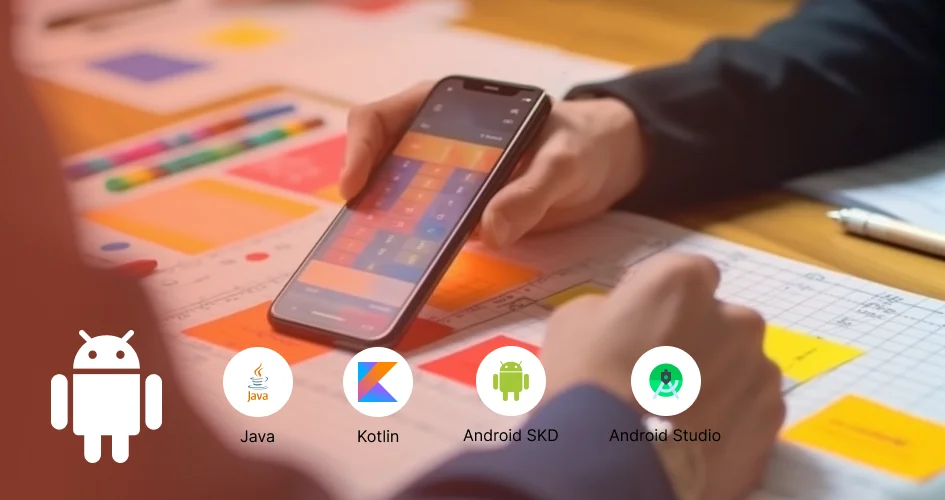Selecting the right framework for Android development will be beneficial for the stability and security of your app.
This in turn will positively impact how users perceive your app.
If your Android app is appreciated by the users, they will be inclined to promote the product to their circle and wider audience.
As a result, your Android app will continue to scale and reach greater heights, such as generating thousands of downloads and climbing up the ranks in the App Store.
Still, deciding on the Android app development frameworks that will integrate seamlessly with your platform can be daunting.
Thankfully, you are in the right place.
Here, we have curated the best selections of Android app development frameworks to help you get started in growing your enterprise.
But first, let’s understand what an Android app development framework is and what aspects to focus on when selecting the suitable tech stack.
What Is an Android App Development Framework?
An Android app development framework is a set of tools that come with ready-to-use templates, components, and components to create a functional app.
This framework is equipped with pre-written code segments specifically tailored for Android to speed up Android development, enabling Android mobile application developers to recycle the code with ease.
The primary purpose of an Android app development framework is to establish a uniform architecture across Android app features and devices so that the overall quality can be maintained.
For a superior-quality Android app, it is important to assess which frameworks are best suited to the functionality of your app, which we will cover in the next section.
Most Important Elements to Look Out For in an Android Development Framework
When talking about Android app development frameworks, a range of options are available.
- Compatibility: Make sure your framework supports various Android app types, operating systems, and devices.
- Performance: Search for a framework that is lightweight and easy to boost your Android application performance with faster load times.
- Proven Support: Every framework has its learning curve, so it’s important for Android app developers to have access to a large and active community to look for a solution when stuck on an issue.
- User Experience: For your app to be well-received by the wider audience, go with a framework that can optimize for user interface and user experience (UI/UX).
- Development Time: It is important that your Android app framework can help your project to be completed on time or even faster than expected as it can directly impact the cost of Android development your company needs to spend.
- Integration: Aside from compatibility, ensure that your framework can integrate with third-party tools and services (APIs or databases); especially if your Android app manages medium to huge volumes of data.
- Security: Also crucial for data-heavy apps, make sure to protect user information at all costs.
- Scalability: Choose a framework that can guarantee the stability of your app with increased usage.
- Development Team Skills: If you have lean human resources, make sure that the framework you select is easy to implement for your existing team. In any case, you can always go with an outsourcing solution, such as Intelivita, to upgrade your technology stack for Android development.
Top 5 Android App Development Frameworks
As an Android app development company with years of experience solving different case studies, we have tried and tested a range of frameworks.
So here it is – our list of the best frameworks that also takes into account the latest Android development trends.
#1. Flutter
Flutter is an Android development framework by Google to build natively compiled, multi-platform applications from a single codebase.
As an open-source framework, Flutter combines ARM or Intel and JavaScript and adaptive design or optimal performance across devices and high responsivity in all screen sizes.
For Android app mobile developers, Flutter gives them flexibility over customization with features such as automated testing and developer tooling.
Hundreds of pre-made or custom layout, visual, platform, and interactive widgets are available for developers to use in the SDK.
An example of an Android app powered by flutter is the popular eWallet Google Pay.
Thanks to Flutter’s scalability, Google Pay can bring out unique features as they expand to new countries sustainably.
Even if Google had to move their code to Flutter at first, the migration was carried out smoothly without extra cost or effort.
As a result, the Google Pay team was able to hit time-to-market faster, thanks to Flutter’s easiness in terms of code management and update that eliminates constant re-patching of defective code.
#2. Android Jetpack
Jetpack is a suite of libraries released officially by Android to develop high-performing applications that work consistently across Android versions and devices
Android Jetpack eliminates boilerplate code and manages repetitive activities such as background tasks, navigation, and lifecycle management to help developers focus on building the app.
This framework will also ensure that your app is highly secure, following the best practices with backwards compatibility baked in to enable fewer crashes and less memory leaks.
Jetpack also provides a modern design toolkit called “Compose”, which is perfect for developing a native UI that runs on less code, powerful tools, and intuitive Kotlin APIs.
#3. Corona SDK
Corona SDK is a 2D game engine that supports cross-device and system compatibility.
If you are doubting whether to release your game on Android vs iOS, why not both?
Corona makes it simple for developers to create and publish projects on Apple, Windows, and Android desktop, TV, smartphones, and tablets.
Corona is also an ideal framework both for indie developers or large publishers as it is completely free, yet it also comes with plenty of premium features.
For example, Corona is based on Lua, an open-source scripting language that is fast, lightweight, and powerful.
This SDK framework also brings onboard numerous plugins with extensive functionality for in-app advertising, media, and analytics.
If the plugin does not yet support the features you’d like to release, not to worry! With Corona, you can call any native library or API (C/C++/Obj-C/Java).
Most of the successful games we know today are made with Corona SDK, namely Angry birds, Civilization, and War Craft.
#4. NativeScript
NativeScript is an open-source framework and, as the name implies, designed to build native mobile apps.
It uses JavaScript and CSS for rendering the UIs for native-live experience.
It is also compatible with modern web frameworks such as Angular, Vue.js, and TypeScript.
For styling a sleek UI, NativeScript is the go-to solution as it combines JavaScript with a subset of CSS.
The built of NativeScript itself also comprises runtimes, CLI (command-line interface), plugins, and core modules.
NativeScript is adopted by businesses across sectors, from retail and banking to communication and agriculture.
One Android app that uses NativeScript is Activelook, which connects your display and smart glasses to the information you need in real time and right in front of your field of view.
#5. React Native
Perhaps this is one of the most well-known Android development frameworks on this list.
React Native is a framework developed by Facebook to build mobile apps using JavaScript libraries.
This framework is the perfect choice if you have built a desktop app with React JS and need to deploy the mobile version.
React Native is most commonly used for creating custom applications for both iOS and Android, especially if you are looking for a framework that helps reduce development time and costs.
Businesses also use React Native when they need to bring an MVP (minimum viable product) to the market.
Overall, this framework will be great for you if your app does not include complex animations and native tools such as Bluetooth and geolocation.
Thousands of apps are made with React Native, including big names such as Facebook, Amazon, and Microsoft.
Conclusion
How users perceive your app, at the end of the day, will be determined by the performance, security, and usability of your Android app.
That’s why building a great app has a lot to do with the frameworks that you choose.
As an Android app development company with years of experience, Intelivita is here if you need to consult the best Android frameworks that will improve the productivity of your Android app.
We have worked with clients such as Samsung to realize the tech stack of their dreams.





